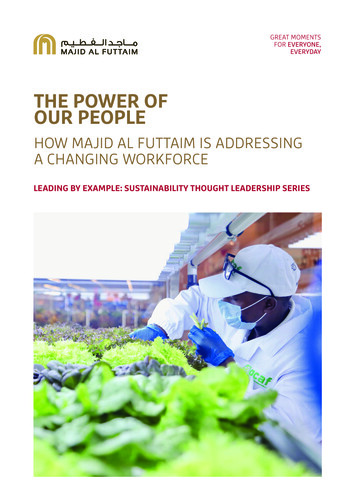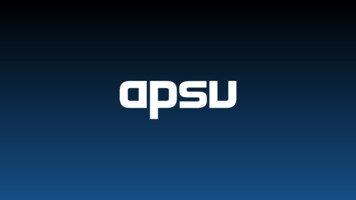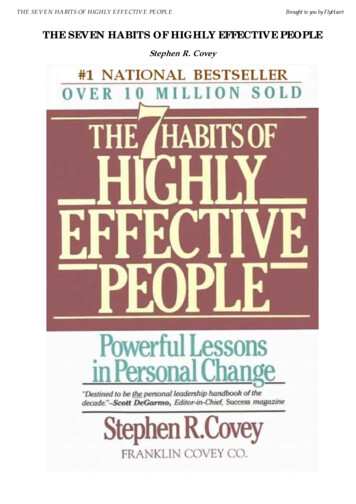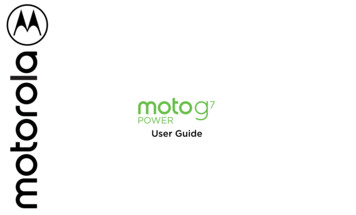
Transcription
THE POWER OFOUR PEOPLEHOW MAJID AL FUTTAIM IS ADDRESSINGA CHANGING WORKFORCELEADING BY EXAMPLE: SUSTAINABILITY THOUGHT LEADERSHIP SERIES
IN THIS REPORT1THE POWER OF OUR PEOPLE2EVOLVING VALUES IN THEMENA REGION4THE CHANGING NEEDS OF TODAY’SWORKFORCE8HOW WE ATTRACT AND RETAINTALENT AT MAJID AL FUTTAIMWe DARE TOempowerour people tounlock theirfull potential12 THE FUTURE IS OUR PEOPLE13 REFERENCES AND CITATIONSLEADING THE WAYThe COVID-19 pandemic has revealed theimportant responsibility of businesses tosupport and connect with their employees.I have been inspired by the individual andcollective actions of our workforce, theircare for one another and their continuedcommitment to our sustainability missionand goals. I also understand that, toexpect the best out of our employees,Majid Al Futtaim must ensure that ourattraction and retention strategies effectivelymeet their needs and expectations.This requires an understanding of how wecan enhance the employee experience and,in turn, ensure continued confidence in ourmission. As we recover from the crisis andcontinue to address society’s most pressingchallenges as a leading sustainabilitybusiness, it is imperative that we have thebest talent in place who are aligned toour values. It is only through ensuring ouremployees feel empowered in their rolesevery day, that we can successfully driveforward our sustainability strategy togetherand contribute positively to the lives of ourmost valued asset, our people.Ibrahim Al-Zu’biChief Sustainability OfficerMajid Al FuttaimOUR STRATEGYIn 2018, we launched our Company-widesustainability strategy, Dare Today, ChangeTomorrow. Our bold strategy will transformthe way we do business and embedsustainability thinking in everything we do.The strategy sets out 21 material issuesand 11 ambitious Sustainable BusinessCommitments across three strategic focusareas: Transforming Lives, RethinkingResources and Empowering Our People.THE POWER OFOUR PEOPLEIn recent times, businesses have been operating in a highly competitive space whenit comes to attracting and retaining top talent. Despite this challenge, only 18% ofexecutives at Fortune 500 companies believe highly talented individuals are recruited bytheir organisation and a further 93% believe their organisation struggles to retain theseemployees1. There are many reasons why businesses might be failing in this area, suchas a lack of employee engagement and opportunities for growth, a culture of distrust, adisconnect in values, and employee mental, physical and financial distress.OUR SUSTAINABLE BUSINESSCOMMITMENTAll Operating Companiesmust embed sustainabilitywithin their attraction,retention and developmentprogrammes in order to meetthe evolving values of theworkforce.ATTRACTING& RETAININGTALENTOUR ALIGNMENT TO THE SDGS.Our Attracting and Retaining Talentcommitment contributes to:At the same time, organisations aregrappling with an increasingly mobileworkforce as employees search forcompanies that can better meet theirneeds. This is evidenced in a 2017 surveywhich found that, in the MENA region,60% of respondents planned on findinga new job within the year2. In addition,employees increasingly expect more fromtheir employers and so the now mundaneofferings of competitive pay and employeediscounts are no longer sole decidingfactors in attracting and retaining today’sworkforce. In response, employers arepushed to position themselves as highperformers in areas such as employeebenefits, health and wellbeing andrecruitment. When the cost of replacingan employee is estimated to be “from tensof thousands of dollars, to 1.5-2x theirannual salary”3, retaining talent becomesan organisational priority based on the costimplications alone.1
EVOLVING VALUESIN THE MENA REGIONThe COVID-19 pandemic has emphasised theimportant responsibility of organisations to takecare of employees, whether that be ensuringthe right health and wellbeing programmes arein place or that employees feel well-informedthrough honest and open communications.At Majid Al Futtaim, we are committedto evolving our attraction and retentionprogrammes to make sure they encompassthe values and needs of our workforce as webuild a new and improved normal.A shift in focus towards values such as healthand wellbeing has not just occurred at theindividual and company level but at the nationallevel; this is seen in programmes such asthe United Arab Emirates (UAE) NationalProgramme for Happiness and Positivity. As wellas appointing a Minister of State for Happinessand Wellbeing, the programme aims toestablish happiness and wellbeing as a lifestyle,integrating this philosophy throughout policies,programmes and services4. Importantly, theprogramme is focusing on the role of the privatesector through the launch of the Business forWellbeing Council in 2019. Founded by eightcompanies with an annual revenue of overAED 200 billion, including Majid Al Futtaim,the Council aims to promote wellbeing inthe workplace through the development ofinnovative programmes, policies and initiativesthat can serve over five million people employedin the UAE private sector5.95%Approximately 93% of professionalsin the MENA region surveyedstated that organisations have aresponsibility to encourage healthand wellbeing in the workplace1185%Almost 80% of professionals say theywould prefer a company who offeredthe option of remote working787%2In the UAE, more than 95% ofemployees state that if they werehappier at work, they would bemore productive693%85% of workers in the MENAregion would move to a differentcompany for opportunities intraining and career development780%In companies where transparencyhas fallen, the likelihood of anemployee leaving increased by87% during the COVID-19 pandemic83
THE CHANGING NEEDSOF TODAY’S WORKFORCECOMMUNICATE WITHTRANSPARENCY AND OPENNESSEmployees in today’s workforceexpect a lot more from theiremployer than they did 30years ago and, in response,organisations are becomingincreasingly employee-centric.Although not all companies areresponding as proactively asothers, there are several trendsthat are particularly importantfor attracting the best talent andkeeping employees engaged intheir roles.4PROMOTE HEALTHAND WELLBEINGTransparent and open communicationwith employees has long been key tohigher retention rates.The focus on improving health andwellbeing is a trend being experiencedglobally.The value of communication has beenaccentuated during COVID-19, at a timewhen employees have been facing significantdisruption and stress, both personallyand professionally. With what was oncean unimaginable level of remote working,it is vital that employees continue to feelsupported amid unprecedented uncertainty andcontinuously changing circumstances. Regularcommunications that are honest, informativeand invite open, two-way conversations areneeded. In fact, a recent study showed thattransparency regarding ‘what the organisationknows and doesn’t know’ was the top responsefrom employees when they were askedabout what is needed from future corporatecommunications9, and an 85% increase inemployee engagement was reported whencompanies prioritised transparency during thecoronavirus8. For example, a former CEO ofLinkedIn established a culture of openness byholding fortnightly meetings with employees toencourage their idea suggestions, and socialmedia company Buffer, publicly shares allemployee salaries in a bid to establish completetransparency over how these are calculated10.When organisations are open and transparent inthis way, it helps build a relationship based ontrust and provides employees with informationto reduce ambiguity and drive engagement.The shift to sustainable lifestyles has triggereda demand for healthier diet options such asveganism, new fitness trends, and a growingawareness and discussion around what wereonce considered taboo topics like mentalwellbeing. With employees making their ownhealth and wellbeing commitments at homeand in their personal lives, it has become anexpectation that health and wellbeing will beprioritised in the workplace too. In a survey ofprofessionals in the MENA region, approximately93% stated that organisations have aresponsibility to encourage health and wellbeingin the workplace11. The Dubai Chamber ofCommerce was recognised for its commitmentto workplace health and wellness through itsSehhati programme, meaning ‘My Health’. Theinitiative ran for ten months and supportedemployees in establishing an active andhealthy lifestyle. As a result, the organisation’sabsenteeism rate dropped by 56%12, a clear signof increased employee engagement. Anotheremployer making health and wellbeing theirfocus during the COVID-19 pandemic is AllyFinancial. As well as supporting almost 9,000employees in setting up remote working, thecompany has provided education and toolsto support physical and mental health whileworking remotely, including access to medicalprofessionals; paid leave for those lookingafter a sick relative or diagnosed with the virus;complete coverage for coronavirus testing;online health services; and increased caresupport for children or adults13.BUILD A DIVERSE ANDINCLUSIVE CULTUREOrganisations delivering on theirpromise of fostering a diverse andinclusive culture have never been moreimportant to employees than today.When searching for a job, 67% of workersconsider employee diversity as a significantfactor14 and, for 83% of millennials, an inclusiveculture is vital for establishing active employeeengagement15. Despite the importance ofdiversity and inclusion to employees and theproven benefits to “creativity, productivity andinnovation”16, many organisations are fallingshort of employee expectations. One companyharnessing the power of diversity is Sodexo,where over 50% of staff and directors arefemale. Through programmes such as theirGender Balance Networks, the company hasdiscovered that achieving gender balance hasincreased engagement among employees by4%17. Against the backdrop of the Black LivesMatter movement, the public and employeesare looking to their employers to be transparentregarding how they are increasing diversity andinclusion at work. Glossier, a beauty company,has shared the way they aim to do so on socialmedia. It plans to engage in dialogue withformer employees who can share insight andideas; all employees will complete ongoingtraining on anti-racism, equity and inclusion;people hired in management positions will bescreened for extensive experience in peoplemanagement of diverse and inclusive teams;and, a ‘no-tolerance policy’ will be promoted toprotect its employees from discrimination byboth customers and colleagues18.5
THE CHANGING NEEDSOF TODAY’S WORKFORCEGROW EMPLOYEEENGAGEMENTThe benefits of employeeengagement go beyond simplyhaving a happy workforce.Engagement creates an environment whereemployees are willing to go the extra mile toreach the organisation’s goals because theyfeel connected and invested in the company’smission. Increasing employee engagementis an effective talent retention strategybecause when employees feel valued, theyeffectively contribute to business outcomesand are less likely to seek new employment.For example, Salesforce has worked hard tocreate an employee-friendly culture basedon the evolving needs and values of today’sworkforce. The company offers their employeesthe opportunity to spend 56 hours of paidtime volunteering, contributing to importantissues in their local communities19. Theyhave used their physical workspace to createareas dedicated to mental wellbeing, and theygive employees 100 every month to spendon absolutely anything19. Another example isNetflix, who favours treating their employeesas respected equals across the business.As a result, the company has managed toachieve higher than average retention ratesdue to, among many other benefits, offeringemployees a year of paternity leave with payand unlimited holiday22. Employees and teamsare empowered to manage employee absencein line with the peaks and troughs of businessactivity and avoid drops in productivity duringbusy periods.6SUPPORT CAREERDEVELOPMENTWorkforce training and developmentis a necessary step for ensuringemployees are equipped with theappropriate skills to cope in today’sdynamic work environment.It is also an effective attraction and retentionstrategy, considering that 72% of job seekerspursue organisations with opportunities forcareer progression20. By creating an effectivetraining and career development programmethat prioritises employee progression andgrowth, organisations can reap the benefits of amore loyal workforce as 93% of workers stay atorganisations who invest in their careers21. Onecompany known to prioritise employee growthis Hyatt, the hospitality company. Despite thehigh turnover typically experienced by hotelbrands, Hyatt’s housekeeping staff have anaverage tenure of 12 years or more and over14,000 employees have been with the companyfor more than 15 years22. This is partly drivenby a training programme that centres aroundemployee empowerment and advancement atall levels, giving employees the tools to operateat their highest level and contribute to businessoutcomes. The company encourages employeesto pursue further education and reimbursesassociated tuition fees22, and employee referralshave become the top resource for new hires,demonstrating the positive company perceptionheld by employees23.7
HOW WE ATTRACT AND RETAIN TALENTAT MAJID AL FUTTAIMAt Majid Al Futtaim, we are continually striving to ensure that weattract the top talent available and, in turn, that we provide ouremployees with a supportive workplace that fosters their health,wellbeing and career development. We know that when ouremployees are happy and feel supported, they will help us bringto life our sustainability and business missions, and that this willinspire them to be sustainability champions within Majid Al Futtaimand in their day-to-day lives.ATTRACTING TALENTTo continue to attract the best and brightest talent, we are working to embed sustainability into ourtalent attraction programmes for all roles at Majid Al Futtaim. We worked to integrate sustainabilityinto the employee value proposition of all job roles and recruitment channels to ensure thatall prospective employees understand our commitment to operating as a leading sustainablebusiness. We know that many employees are looking for far more from their employers than theyhave done in the past and it is important that we highlight sustainability and wellbeing initiativesthat we have in place.DIVERSITY & INCLUSIONDiversity and inclusion have been identified as a priority for our business. It is clear to us that havinga diverse and inclusive organisation means the needs of our employees and customers are betterrepresented by our workforce demographics and that employee role models are present throughoutthe business. This year we have developed a Company-wide Diversity and Inclusion policy. This willenable us to embed strong diversity and inclusion practices throughout the organisation. We alsopromote networks that serve particular groups in our Company, such as the Diversity and InclusionTaskforce, to ensure we support all our employees at the different stages of their lives. For example,in consultation with our female colleagues and with the aim to support mothers returning to work,we have created dedicated nursing rooms at our corporate offices and at Majid Al Futtaim – RetailUAE. Another such group is the MENA region’s first People of Determination Advisory Panel, whichwe are proud to have launched. The panel includes a wide range of members including the UAEMinistry of Community Development, Dubai Municipality and Sharjah City for Humanitarian Services,independent experts, and customer representatives who are people of determination or parentsof children of determination. The aim of the panel is to contribute to the UAE government’s effortsto make society more inclusive and ensure that our services are accessible for all members of thecommunity. Lastly, we are working to enhance our hiring practices and ensure they are fair andinclusive. This includes ensuring our candidate pools are diverse and that hiring managers havereceived training on best practice for inclusive hiring and unconscious bias.TRAININGRETAINING TALENTAs well as attracting top talent, it is even more crucial that we create a workplace that fostershealth, wellbeing and career development for all our employees. Only in this way can we reach ourgoals, bring our ambitious sustainability mission to fruition, and ensure our employees want tocontinue working at Majid Al Futtaim for years to come. As part of our 2020 targets, we conductedan extensive review and gap analysis of all the ways we retain talent. This enabled us to highlightthe many positive steps we are already taking, so that we can showcase them to our employeesand formally and consistently implement them across each of our Operating Companies. Thereview has also served as a first step for developing a host of new initiatives aiming to improve ourtalent retention programme, some of which are described in the following sections.8One of our key strengths in fostering and developing our employees’ careers is through our wideranging and extensive training and career development programmes. We use training to empowerour people to develop their careers within our organisation through our Leadership Institute, whichdevelops world-class training. With sustainability at the core of our business, it is key that ouremployees receive training on our Dare Today, Change Tomorrow strategy. Last year, we developed anonline sustainability e-learning that was delivered to all our office-based staff. We also developeda sustainability training for each of the cohorts in our ‘Top Talent’ programme, where some ofour highest achieving employees are given a deep dive into sustainability and how they can besustainability champions within our business. This year, we are developing a sustainability trainingprogramme that will be delivered to all our 34,000 frontline employees, empowering them to bringDare Today, Change Tomorrow to life on the frontline of Majid Al Futtaim venues.9
HEALTH AND WELLBEINGOur commitment to supporting our employees’ health and wellbeing is vital for our ambition tomake Majid Al Futtaim a stand-out working environment. We have an extensive range of resourcesand initiatives aimed at meeting this goal.Every year, we send out a Company-wide ‘Healthy Workplaces’ survey to gain a clear understandingof the ways in which we can improve our employees’ wellbeing while at work. We use the resultsof the survey as a central resource for the development of new health and wellbeing initiatives,as well as a vital way for us to gauge our employees’ responses to initiatives we have already putin place. Results of the survey have helped us to implement initiatives such as providing healthyfood options in our offices, providing an in-house doctor and psychiatrist, and creating WellnessChampions across our organisation, whose role is to support employees and champion wellbeing inthe workplace.Every year, we hold our Company-wide Wellness Week, which hosts a diverse range of sessionsaimed at supporting and raising awareness about health and wellbeing. This is an incrediblysignificant week in our calendar and is always well-attended by employees across the organisation.Our initiatives include one-to-one sessions with financial advisors, mental wellbeing advice,nutrition and cooking classes, fitness classes, medical consultations, health screenings, and somany more. These sessions are a great way for us to show our employees how much we care and toact as a springboard for them to lead healthy and happy lives.SUPPORTING STAFF DURING COVID-19The coronavirus pandemic has been a momentous and unprecedented event that has affectedlives on a global scale, and we recognise this has been an incredibly challenging time for all ouremployees. From the beginning of lockdown restrictions across the region, our team showedincredible resilience and agility in supporting one another, while making rapid changes to theways in which we work. We worked hard to shift all our training sessions online, including thisyear’s Wellness Week, which became a virtual event. This enabled our employees to continuedeveloping their careers and engage with a variety of events aimed at supporting their wellbeing,all from the comfort and safety of their homes. We also created ‘MAFers Supporting MAFers’,where Majid Al Futtaim employees, who have a background in mental health support, providedone-to-one support sessions to their colleagues during the pandemic and lockdown.It was important to us that we found ways to remain adaptable so that we could ensure thesecurity of our business and our frontline employees’ employment at a time when many of ourvenues were not legally accessible. We were able to successfully train and redeploy over 10,000frontline employees from other areas of the business to help work at our Carrefour stores anddistribution centres.1011
REFERENCES AND CITATIONSTHE FUTUREIS OUR PEOPLEAt Majid Al Futtaim, we are focused on driving forward our commitment toenhancing talent retention, career development and employee wellbeing,and have a number of key initiatives planned for the remainder of 2020 andinto next year. We are in the process of developing sustainability sessions forall our frontline employees in our Properties, Retail and Ventures OperatingCompanies. These training sessions aim to support our frontliners inunderstanding our Dare Today, Change Tomorrow strategy, as well as how theycan contribute to sustainability in their roles and wider lives. We hope theywill become confident to engage customers on sustainability topics. In 2021,we plan to develop sustainability training for our tenants and Tier 1 suppliers.These collective actions will enable us to drive forward our strategy andsupport the achievement of our 2022 Sustainable Business Commitment toprovide role-specific sustainability training to all employees and sustainabilitytraining throughout the value chain. We will continue to focus on improvingour employee wellbeing offering, utilising the results of our annual HealthyWorkplace survey to inform key actions for the coming year. With therecognition of Diversity and Inclusion as a key priority, we plan to take theimportant steps to implement our Company-wide policy next /press-releases/story/932 of MENA professionals say employers are responsible to promotehealth and wellbeing at work Baytcom g-care-of-employees-during-covid19/?sh nypulse.com/blog/employee-retention-examplesThis past year has been an incredible challenge for organisations andindividuals around the world, requiring flexibility to meet the evolving needsarising from an unprecedented global pandemic. Organisations and individualshave demonstrated incredible agility and resolve, and at Majid Al Futtaim, wehave worked hard to implement changes at pace, support our employees andmaintain resilience in these challenging times. We are steadily recovering fromthese challenges, which is testament to the value we have placed on investingin far more than just the financial; our investment in our consumption,community and our people is paying off.1213
MAJID AL FUTTAIMMajid Al Futtaim Tower 1City Centre Deira ComplexPO BOX 91100Dubai, United Arab EmiratesT 971 4 294 9999majidalfuttaim.com
The strategy sets out 21 material issues and 11 ambitious Sustainable Business Commitments across three strategic focus areas: Transforming Lives, Rethinking Resources and Empowering Our People. We DARE TO empower our people to unlock their full potential OUR SUSTAINABLE BUSINESS COMMITMENT











